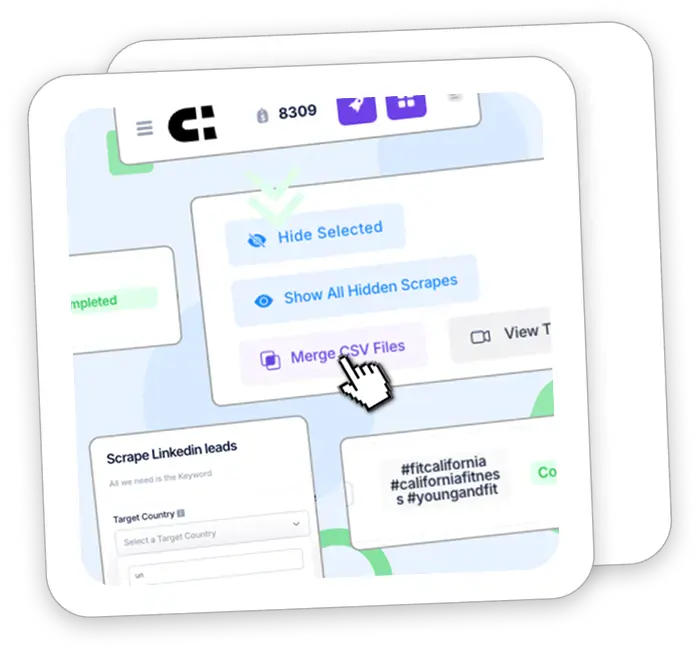Business Contact List: The Unseen Lever of Business Growth
6 mins read
Business Contact List: Your Compass in the Digital Marketing Landscape
The digital world is a complex and ever-evolving landscape, where connection is the currency that drives growth. But amidst the swirling storm of data and information, how do businesses find their bearings and chart a course to success? The answer lies in a potent yet often overlooked tool – the Business Contact List.
A Business Contact List is like a compass in the hands of modern enterprises. With it, companies can navigate their way through the digital ocean, directly reaching those who matter most – their clients and potential customers. But this isn’t just a static register of names and email addresses. It’s a dynamic, evolving repository that reflects the changing landscape of the market and the shifting interests of the audience.
To put it simply, a Business Contact List can act as the bridge connecting businesses with their customers in the digital world. A bridge that is not just built once, but continually reinforced and adjusted to ensure that it facilitates meaningful and productive connections.
As we delve deeper into this topic, we’ll uncover how this unassuming tool holds the potential to propel businesses forward in today’s fast-paced digital ecosystem. So, buckle up and join us on this journey into the world of Business Contact Lists – a journey that promises to redefine your understanding of modern business growth.
Table of Contents
Unveiling the Business Contact List
To further appreciate the value of a Business Contact List, it’s crucial to understand what it encompasses. At its most basic, a Business Contact List is a compilation of crucial data about potential clients, customers, or stakeholders. This information usually includes names, email addresses, phone numbers, and even specific details like job titles or areas of interest.
The Foundation of Personalized Marketing
The power of a Business Contact List lies in its ability to allow businesses to communicate more personally with their target audience. By having direct contact information, businesses can tailor their marketing and sales efforts to match the needs and preferences of each contact. This level of personalization helps build trust and connection, both vital elements in establishing a fruitful business relationship.
Business Contact List: A Vital Business Asset
In essence, the Business Contact List is not just a list but a dynamic asset that can be cultivated and optimized over time. It allows a business to keep its finger on the pulse of its audience, stay attuned to their shifting needs, and ultimately, drive sustainable business growth. As we delve deeper, we’ll discover how to construct and nurture this vital business asset, as well as some of the best practices for leveraging its potential.
Curating Your Business Contact List: The Initial Steps
The process of creating a Business Contact List begins with identifying your target audience. Who are the people most likely to be interested in your product or service? What are their needs, preferences, and behaviors? Answering these questions is essential because it informs the kind of information you’ll need to gather.
Once your target audience is clearly defined, you can start collecting their contact details. This can be done through a variety of methods, such as online forms, social media engagements, events, and more. The goal is to encourage potential contacts to willingly share their information with you, often in exchange for something of value like exclusive content, product discounts, or useful industry insights.
Making the Most Out of Your Business Contact List
After collecting the necessary contact information, the real work begins. You need to organize and segment your Business Contact List. This means dividing your list into smaller groups based on various factors such as their needs, interests, or position in the sales funnel. Such segmentation allows you to tailor your messaging for each group, making your marketing efforts more targeted and effective.
Finally, you need to continually update and cleanse your list. People change jobs, email addresses, even their names. Ensuring that your list remains accurate and up-to-date is crucial in maintaining effective communication with your contacts.
A Versatile Tool for Business Success
In essence, a Business Contact List is a versatile tool that can help businesses of all sizes and industries reach their growth goals. From customer acquisition to retention, it plays a pivotal role in various aspects of a business. In the following sections, we’ll delve deeper into the various strategies and best practices for maximizing the benefits of a Business Contact List.
Harnessing Technology to Optimize Your Business Contact List
In this digital age, technology is an ally that can dramatically streamline the process of creating and maintaining a Business Contact List. From customer relationship management (CRM) systems to email marketing platforms, various tools can help you manage and optimize your list.
For instance, CRM systems can automate the process of gathering and storing contact information, making it easier to keep your list up-to-date. They also offer functionalities for segmenting your list and tracking interactions with your contacts, providing valuable insights to refine your marketing strategies.
Maintaining Privacy and Trust
As you use these technologies to optimize your Business Contact List, it’s important to remember that privacy is paramount. It’s crucial to respect the privacy of your contacts and adhere to all relevant data protection regulations. This not only prevents legal issues but also builds trust with your contacts, which is essential for any successful business relationship.
The Path Forward: Continual Learning and Adaptation
Creating and managing a Business Contact List is not a one-time task. It’s an ongoing process that requires constant attention, learning, and adaptation. Trends change, new technologies emerge, and customer behaviors evolve. Staying updated with these changes and continually refining your strategies is key to maximizing the value of your list.
In the next sections, we will dive deeper into some of the best practices for managing a Business Contact List, including strategies for effective segmentation, ways to ensure privacy and compliance, and tips for leveraging technology for optimization.
Enhancing Relationships: Nurturing Your Business Contact List
A thriving Business Contact List hinges on nurturing meaningful connections. It’s about fostering engagement, not just amassing contacts. In the era of mass marketing, personalized communication is key to boost engagement, whether it’s using contacts’ names or tailoring content based on their interests.
Evolving with the Times: Adapting to Changes
In the ever-evolving landscape of digital marketing, staying static is not an option. What works today might not work tomorrow. As such, it’s crucial to continually evaluate the performance of your Business Contact List and adjust your strategies accordingly.
This involves monitoring key performance indicators (KPIs) such as open rates, click-through rates, and conversion rates, and making data-driven decisions based on these metrics. It also involves staying updated with the latest trends and technologies and exploring new ways to enhance your list.
Concluding Thoughts: The Unseen Value of a Business Contact List
A Business Contact List is more than just a list of names and email addresses. It’s a powerful asset that can fuel your business growth when managed effectively. In the upcoming sections, we’ll delve deeper into the specifics of how to optimize your list, including segmenting your contacts, complying with privacy regulations, and leveraging technology for efficiency. Stay tuned as we unravel the intricacies of this indispensable tool in modern business.
Diving Deeper: Segmenting Your Business Contact List
Segmentation is the act of dividing your Business Contact List into smaller, more specific groups based on shared characteristics or behaviors. This simple yet strategic step can supercharge your marketing effectiveness by ensuring the right message reaches the right audience at the right time. It’s akin to having several targeted mini-lists within your main list.
For instance, you might segment your list based on demographics, purchase history, or engagement level. A well-segmented Business Contact List allows for hyper-personalized marketing, which is a proven approach to increase engagement and conversions.
Navigating Regulations: Privacy Matters
In a world where data breaches are unfortunately all too common, businesses must take their data privacy responsibilities seriously. This applies to all data your business handles, but particularly to your Business Contact List. You must ensure you’re complying with all relevant regulations such as GDPR and CCPA, which have stringent rules about data collection, storage, and usage.
This involves getting explicit consent from your contacts to send them marketing messages, providing them with a way to opt-out if they wish, and safeguarding their data from unauthorized access. By doing so, you not only avoid potential legal repercussions but also earn your contacts’ trust—a valuable asset in today’s digital landscape.
Leveraging Technology: Streamlining Your Process
Finally, it’s worth mentioning the role of technology in managing your Business Contact List. With the right tools, you can automate many of the tasks involved, such as adding new contacts, sending emails, and segmenting your list. This not only saves you time and effort but also reduces the likelihood of human error.
From CRM systems to email marketing platforms, there’s a myriad of technologies available to help you optimize your list management. The key is to choose the ones that best suit your needs and to use them strategically to maximize their benefits. As we delve further into the digital age, harnessing the power of technology in this way will become increasingly vital.
The Next Step: Utilizing Your Business Contact List
In this section, we’ll unlock the potential of your Business Contact List. We’ll explore making impactful connections, personalized engagement, and converting your audience into loyal customers – all with a modern, results-driven approach. Let’s delve into turning your list into a catalyst for business growth.
Harnessing Your Business Contact List
Possessing a well-curated Business Contact List is indeed a significant achievement. Yet, the next step – using this goldmine effectively – is where the genuine magic unfolds. Remember, your list is more than just a collection of email addresses; it’s a direct connection with your audience.
Making the Connection
Your Business Contact List provides an opportunity to engage, inform, inspire, and convert your contacts into loyal customers. To achieve this, your marketing campaigns must resonate with your audience. This is where your list segmentation proves its worth.
The Power of Segmentation
Segmentation allows you to personalize your messages, crafting tailored emails that speak to each contact’s unique interests and needs. Whether it’s sending timely offers based on past purchasing behaviors or providing content that they value, segmentation leads to increased engagement and improved customer loyalty.
Driving Conversions
The ultimate outcome of effectively using your Business Contact List is driving more conversions. An engaged and loyal audience is more likely to respond to your calls-to-action, resulting in growth for your business.
The Power of a Business Contact List
In essence, a Business Contact List is an indispensable asset for modern businesses. However, its potential can only be fully realized with strategic management and smart utilization. Harness the power of your list, adapt to the evolving landscape, and witness your business ascend to new heights.
Find your email list by industry
- Get Fresh Veterinarians Email List 2025
- Get Fresh Chief Revenue Officers Email List 2025
- Get Fresh Banking Email List 2025
- Get Fresh Real Estate Email List 2025
- Get Fresh VP Email List 2025
- Get Fresh Retail Industry Email List 2025
- Get Fresh Chief Sales Officer Email List 2025
- Get Fresh Hospitals Email List 2025
- Get Fresh Healthcare Email List 2025
- Get Fresh Restaurant Email List 2025
- Get Fresh Chiropractors Email List 2025
- Get Fresh Hotels Email List 2025
- Get Fresh COO Email List 2025
- Get Fresh Contractors Email List 2025
- Get Fresh IT Decision Makers Email List 2025
Explore more lead generation strategies and tools
- B2B Lead Generation Solutions – Guide for 2025
- How to Build a High-Quality B2B Email List for Outbound Marketing
- Buy Email Lists for Marketing in 2025: Complete Guide to Business Leads
- Why Scrape Google Maps? Use Cases for Sales, Marketing & SEO
- B2C Lead Generation: The 2025 Playbook
- 15 Best Lead Generation Companies for 2025
- Best B2B email list providers in 2025
- Top Lead Generation Agencies Compared (2025)
- 18 Best B2B Lead Generation softwares in 2025
- Lead Generation Guide: Strategies & Tools for 2025





